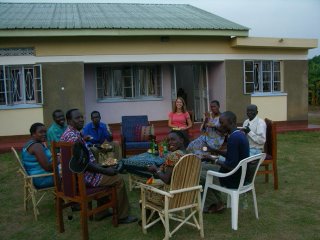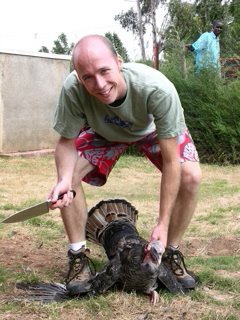
This thanksgiving was the most unique ever. Everything was laughably different from buying our live Turkey from a guy in a bar playing cards to rolling the crust of an apple pie on the kitchen floor. Ben killed Harriet the Turkey himself. We enjoyed sharing our Thanksgiving dinner with our new Ugandan friends in our front yard. Clockwise from Holly: Sandra helps us with laundry and cooking and cleaning. We’re so happy to have her. She is quickly becoming my Ugandan sister and a good friend. She’s tough in an endearing way. At first I was really resistant to house help. It was explained to us that if we didn’t have help people would think we didn’t trust them to be in our home and that when we were able to provide a job for someone we weren’t willing. Sandra is an IDP. Her husband died 5 years ago and the income she gets from working with us will put her two kids through three years of school. Mr. Ouni Obero is our language teacher. He has been displaced twice. First, by the karamojong cattle raiders in the East of Uganda and then by the LRA. We study with him for 4 hours every morning and then eat lunch together. He’s taught us a lot of Lango already and has become our cultural guide. Tom and his wife Immaculate are quickly becoming our friends. Tom was the engineer on our house. They invited us to a traditional introduction/wedding ceremony of their sister that we attended last week. Jackson, is the driver for CPA, husband to 2 wives and father to 22 children. He’s a riot. Matilda is the receptionist for CPA. Emmanuel is a dear man who has inspired us greatly. He has volunteered with CPA from the beginning when his daughter was abducted from Aboke. Last year he received word that she had been killed. He gives new meaning to transcendence. George is the night watchman for CPA.
During dinner we each shared something we were grateful for. Matilda was grateful for an education for her children. George was simply grateful to be alive on that day. Emmanuel and Jackson were thankful that they got to taste “real American food.” Sandra expressed that she felt working with us was a gift from God. Others expressed their thanks in meeting new friends and for the beginning of something good.

